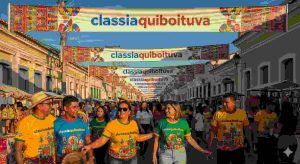I’ll admit it—the first time I heard the word classiaquiboituva, I was curious and slightly confused. It didn’t sound like anything I’d come across in science, wellness, or travel. The name felt unique, almost like it held a story waiting to be told.
After digging a little deeper, I realized it wasn’t just a word—it was tied to culture, community, and even identity. That moment made me reflect on how names like this connect us to traditions while also finding new relevance in modern times.
What Does Classiaquiboituva Actually Mean?
At first glance, classiaquiboituva may seem like a random combination of letters. But for communities familiar with it, the word carries symbolic weight. Names like this often reflect regional traditions, historical events, or local pride.
The meaning of classiaquiboituva goes beyond definition—it acts as a cultural marker. Even people who stumble across it online end up searching for its story, showing how curiosity can transform into deeper cultural learning. It reminds us that words hold power, not just in communication but in identity.
How Did Classiaquiboituva Develop Over Time?
Language always has a history, and so does classiaquiboituva. While its exact roots may be unclear to outsiders, it likely connects to specific towns, community groups, or local practices. Often, words like this emerge from traditions that have lasted decades or even centuries.
Exploring the background of classiaquiboituva gives us more than just etymology—it offers insight into how culture evolves. Communities embrace names, pass them down, and keep them alive as symbols of belonging. Even if global audiences are new to it, locals see classiaquiboituva as part of their shared story.
How Does Classiaquiboituva Shape Cultural Identity?

Culture thrives on names and symbols, and classiaquiboituva is no exception. For some, it may represent a school, a festival, or a sports association. For others, it’s an expression of unity and pride.
When people hear the name, they recall traditions, events, and shared experiences. It becomes more than language—it transforms into a feeling. That emotional connection is what makes classiaquiboituva a cultural identity, a reminder that heritage is alive in both speech and practice.
Why Does Classiaquiboituva Strengthen Communities?
Community is built on connection, and classiaquiboituva often acts as the bridge. Clubs, organizations, or events that use the name become gathering points where people share ideas and memories.
The word itself becomes shorthand for togetherness. People feel seen and included when they identify with classiaquiboituva. In this way, it represents more than tradition—it’s an active force for cooperation, belonging, and collective pride.
Can Classiaquiboituva Be Used in Education?
Absolutely. Schools and teachers often look for ways to connect learning with real life, and classiaquiboituva fits perfectly. By including it in lessons, educators can show students how language ties to history, heritage, and cultural identity.
Young learners enjoy hearing stories about where names come from. When they see classiaquiboituva in projects or local programs, it gives them a sense of pride and helps them appreciate their roots. Education, after all, isn’t just about textbooks—it’s about connecting identity with knowledge.
What Role Does Classiaquiboituva Play in Celebrations?
Festivals and gatherings give classiaquiboituva another layer of meaning. During events, the name shows up on banners, T-shirts, or even chants from the crowd. Suddenly, a word becomes a lived experience filled with joy and pride.
Celebrating classiaquiboituva strengthens bonds between people. Whether it’s in sports, cultural shows, or community festivals, the shared use of the name turns it into a symbol of happiness and unity.
How Has Social Media Changed Classiaquiboituva?

In the past, words like classiaquiboituva may have stayed local. But today, hashtags and digital platforms give it global reach. Someone posting a photo or story with the word can instantly introduce it to new audiences.
This online presence transforms classiaquiboituva into more than tradition—it becomes a cultural brand. Technology ensures that while the roots stay local, the recognition spreads worldwide, connecting communities with both pride and visibility.
Does Classiaquiboituva Have a Role in Business?
Yes, and it’s a smart one. Local businesses often use names like classiaquiboituva to stand out, signal authenticity, and build customer loyalty. A bakery, school, or shop carrying the name immediately conveys heritage and tradition.
People are drawn to businesses that reflect cultural pride. By adopting classiaquiboituva, local brands strengthen identity while also boosting economic impact. It proves how cultural heritage and business success can complement one another.
How-To: Keep Classiaquiboituva Alive in Modern Times
Here’s how communities can ensure the relevance of classiaquiboituva without losing its roots:
- Use it in schools. Let younger generations learn about it through stories and lessons.
- Celebrate it in festivals. Make it part of events, sports, and traditions.
- Integrate it into businesses. Show pride through branding that highlights heritage.
- Share it online. Use social media to preserve and promote its meaning globally.
By combining tradition with technology, classiaquiboituva can thrive for years to come.
Also Read: Can CBD cause Headaches?
FAQ: Common Questions About Classiaquiboituva
What does classiaquiboituva mean?
It represents cultural identity and pride, often tied to local heritage, traditions, and community belonging.
Is classiaquiboituva a place or an idea?
It can be both. Some connect it to towns or landmarks, while others see it as a broader cultural concept.
Why is classiaquiboituva important?
Because it symbolizes unity and pride, helping communities connect across generations while keeping traditions alive.
How is it used today?
In education, business, festivals, sports, and increasingly on digital platforms like social media.
Final Thought: A Name Worth Remembering
Here’s the truth—classiaquiboituva is more than just a word. It’s a living reminder of identity, culture, and pride. Whether it shows up in a classroom, a festival, a sports match, or a hashtag, it carries with it the weight of tradition and the promise of continuity.
My advice? Embrace names like this when you come across them. Learn their story, share their meaning, and celebrate their role in community life. Because sometimes, a single word like classiaquiboituva can remind us who we are—and who we want to be.













